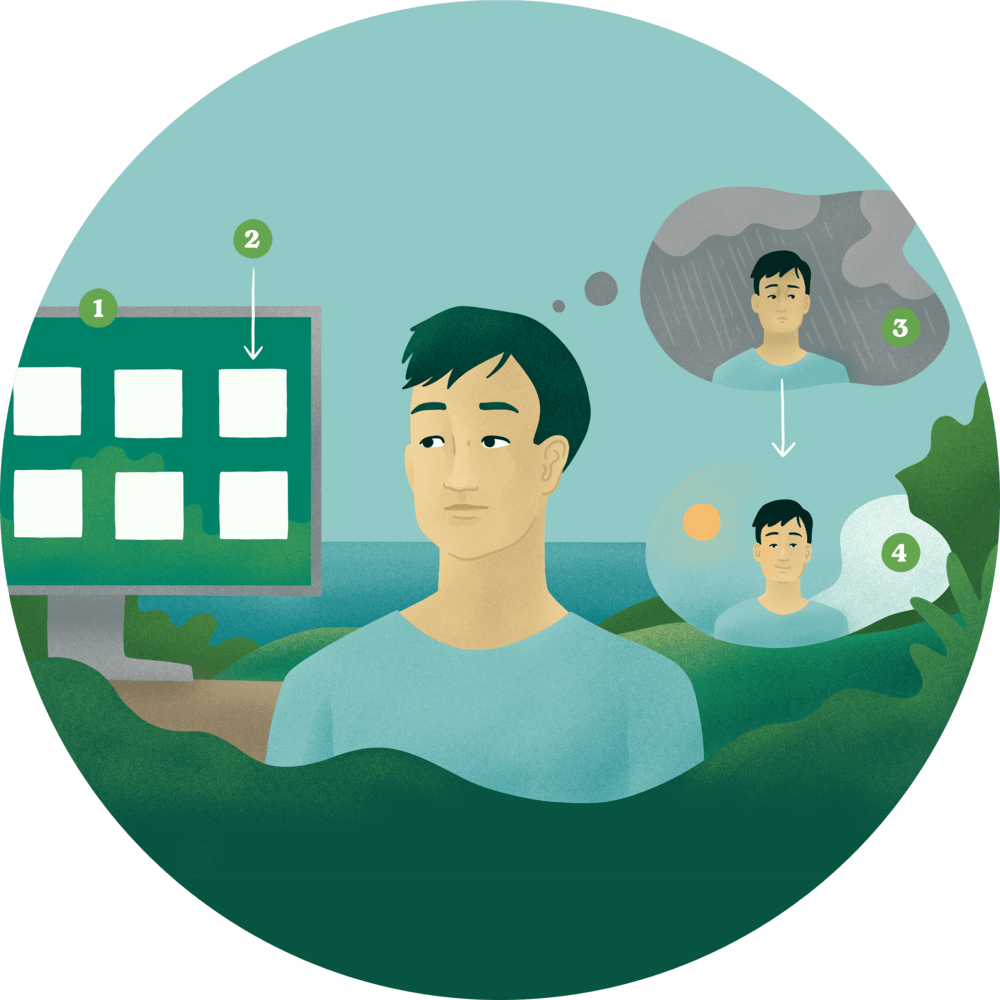
Reframing Thoughts
Reframing Thoughts helps you notice and reframe unhelpful patterns in your thoughts and beliefs.

What is Reframing Thoughts?
Reframing thoughts is when you actively notice unhelpful thoughts in your mind and reframe them into more useful thoughts.
There are some common patterns in people’s thoughts which can lead to practical and emotional problems in everyday life. These are sometimes known as ‘thought distortions’. For example, you might have a rule that “I always put the needs of others above my own self-care", which can lead to burnout. It can be helpful to learn about common unhelpful thought patterns and how to reframe them.
How does it help?
The way you think about what's happening affects the way you feel and behave. For example, if you think other people's needs are always more important than your own, then you may feel sad when you’re alone and always seek to be around people.
By learning to recognise unhelpful thought patterns and reframe them over time, you will begin to feel better and make decisions that support your overall sense of wellbeing.

FAQs
What are the types of unhelpful thought patterns?
Some types of unhelpful thought patterns include:
- Black-and-white thinking: Seeing things as “either/or” with no shades of grey in between.
- Overgeneralisation: Expecting something that happened once or twice to keep happening.
- Catastrophising: Expecting disaster to strike no matter what, “but what if?…”
What if reframing my thoughts doesn’t help?
It’s important to understand that your thought patterns have formed over your lifetime and, like other habits, take a while to change. For example, it can take a while to get used to a new cellphone, but through repetition and mistakes, you adapt to the new layout.
Focus on noticing and changing one unhelpful thought pattern at a time. Every time you notice one of these patterns in your thoughts, stop and remind yourself to reframe your thinking. You can come back to the Reframing Thoughts tool to help you with this. Eventually, the new way of thinking will take over, just like adapting to a new cellphone.
Maybe I’m not good enough?
Not being ‘good enough' is a type of unhelpful belief. These types of beliefs are often hard to see, kind of like the roots of a tree. They are generally formed in childhood through either intense experiences or a series of similar experiences building up over time. Actively reframing thoughts over time can also help you reframe unhelpful beliefs into more positive alternatives.

Try Reframing Thoughts now
Small Steps Toolbox
These tools have been developed to help with feelings of anxiety, stress, or low mood. Each tool only takes a few minutes. Health and wellbeing is an ongoing journey - so try them out and see what works for you.
Balancing Mood
This tool can give you insight into how what you’re doing affects your mood, and recommends activities that can improve how you’re feeling.
Understanding Loneliness
Loneliness is a common feeling we all get from time to time. The tool asks you when you feel lonely and gives insights on why or what you can do about it.
Mindful Watching
During this mindfulness exercise, you’ll be guided by relaxing audio to calmly notice different visual aspects of images and apply this to your surroundings.
Improving Sleep
Improving Sleep is a quiz that helps you explore the things you can do or avoid that can lead to a better quality sleep. There are a variety of tips available so you can choose something that suits your lifestyle.
Identifying Signals
During this exercise, you’ll be guided to identify sensations in your body that you often experience when feeling upset. You can use these as signals to react differently, use a tool, or engage in self-care.
Supporting Others
Supporting Others gives you tips on what you can say or do when you’re helping someone who’s going through a hard time.
Gratitude Practice
Learn to appreciate the small things in life through practising gratitude. Doing this regularly can help lift your mood and make you feel happier.
Muscle Relaxation
Teach your body how to relax better through muscle relaxation. The key is learning to apply this skill in everyday life to the entire body so that you’re not tensing muscles when you don’t need to.
Deep Breathing
This reflective technique involves slowly breathing in and out to help you feel calmer and more relaxed. This tool is guided by an animated image that inflates and deflates.
Active Listening
This skill involves fully focusing on what a person is saying, rather than selectively hearing. In this exercise, you’ll practice listening and develop an awareness of when you’re not paying attention.
Building Self-Worth
This tool helps you on your journey to gain self-worth. Go through the Building Self-Worth card deck for energetic, reflective, or inspirational activities.
